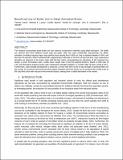Beneficial use of boiler ash in alkali-activated bricks
Author(s)
Poinot, Thomas; Laracy, Michael Edward; Aponte, Cecilio; Jennings, Hamlin Manson; Ochsendorf, John A; Olivetti, Elsa A.; ... Show more Show less
DownloadMuz Brick Paper RCR revision clean.pdf (1.307Mb)
PUBLISHER_CC
Publisher with Creative Commons License
Creative Commons Attribution
Terms of use
Metadata
Show full item recordAbstract
This research incorporates waste boiler ash into masonry construction materials using alkali-activation. The boiler ash, derived from three different Indian pulp and paper mills, has many undesirable characteristics for alkali-activation, including varying shape, large particle sizes ranging from 5 to 600 μm, loss on ignition between 8 and 35%, and less than 4% alumina. When combined with supplementary materials in the form of clay and lime, high compressive strengths are observed in the bricks made with all three ashes, demonstrating the robustness of the proposed mix design. A brick formulation with a solids phase weight ratio of ash(70):clay(20):lime(10), liquid to solid ratio of 0.45, and 2 M NaOH produces bricks with compressive strengths between 11 and 15 MPa after 28 days curing at 30 °C. Furthermore, early strength development is observed, as more than 55% of the 28 day strength is achieved after one day curing. An economic and environmental analysis indicates that these bricks can be produced for similar costs as the clay fired brick with reduced environmental impact, making them a viable alternative in the market.
Date issued
2017-09Department
Massachusetts Institute of Technology. Department of Architecture; Massachusetts Institute of Technology. Department of Civil and Environmental Engineering; Massachusetts Institute of Technology. Department of Materials Science and EngineeringJournal
Resources, Conservation and Recycling
Citation
Poinot, Thomas et al. “Beneficial Use of Boiler Ash in Alkali-Activated Bricks.” Resources, Conservation and Recycling 128 (January 2018): 1–10 © 2017 Elsevier B.V.
Version: Author's final manuscript
ISSN
0921-3449